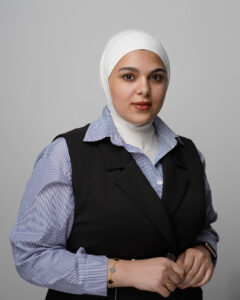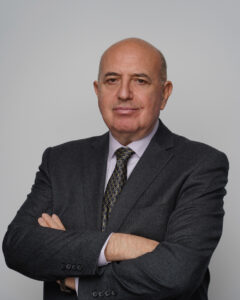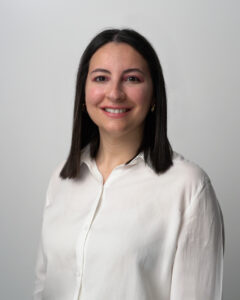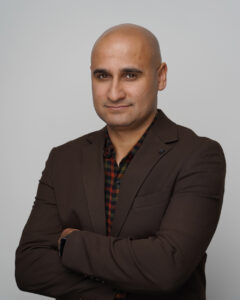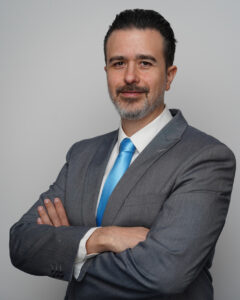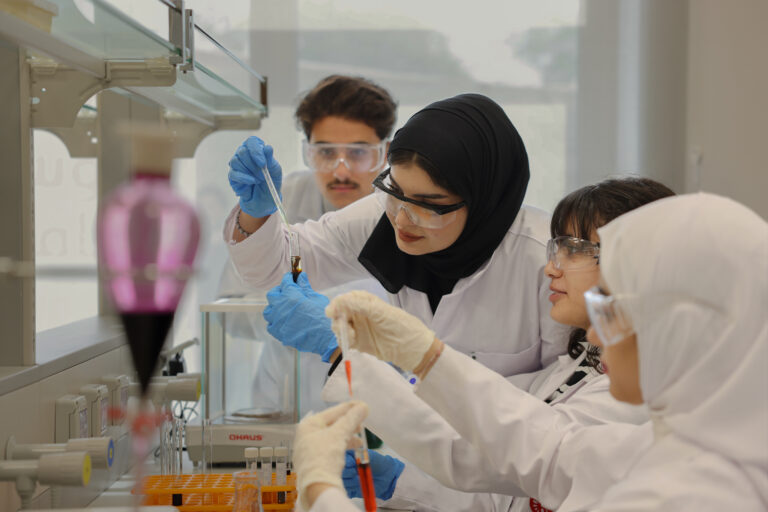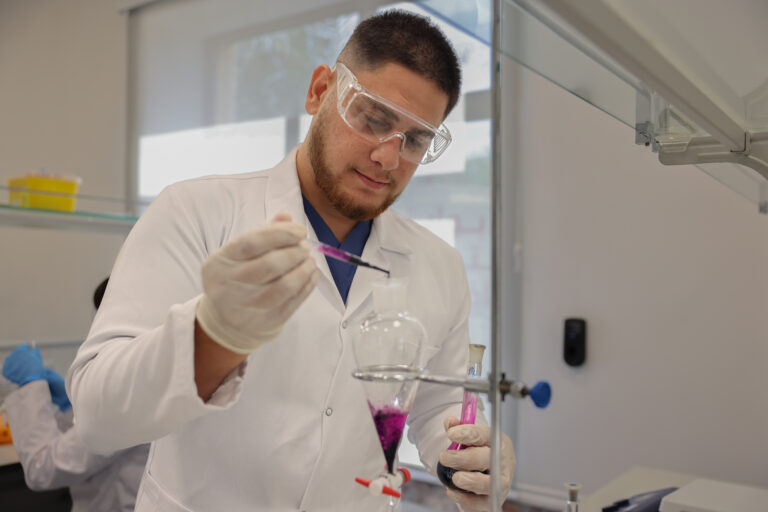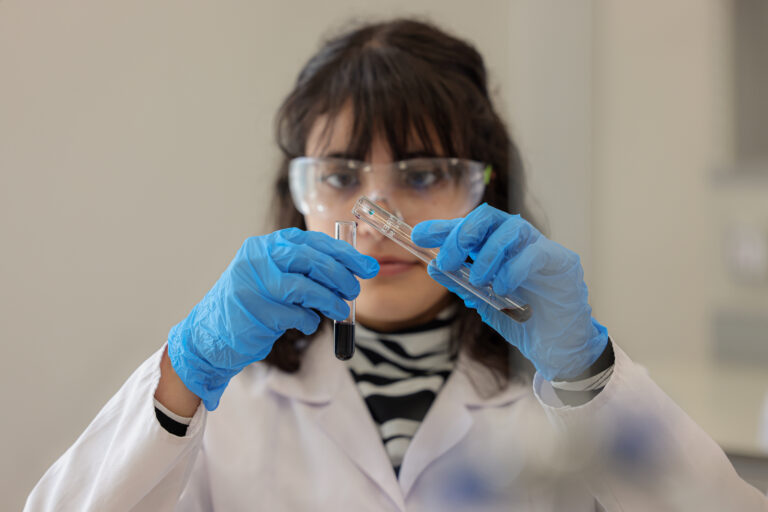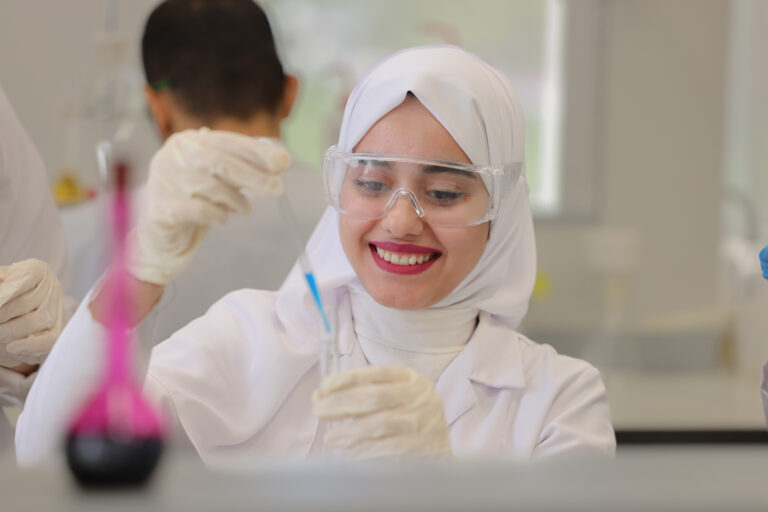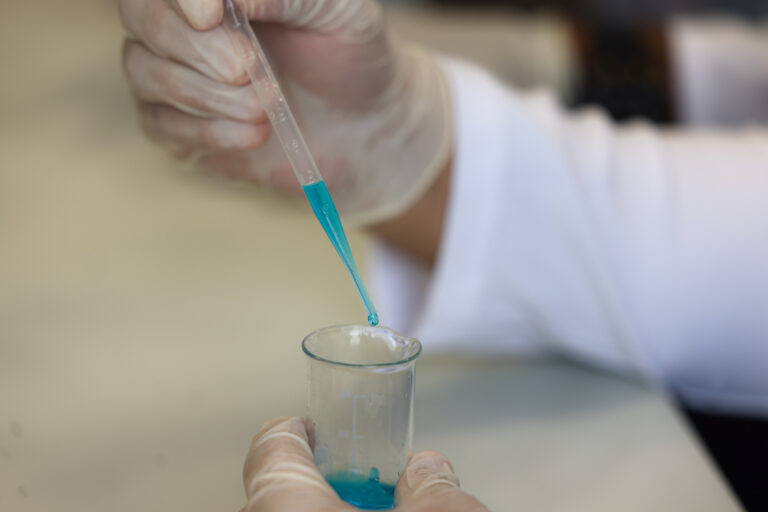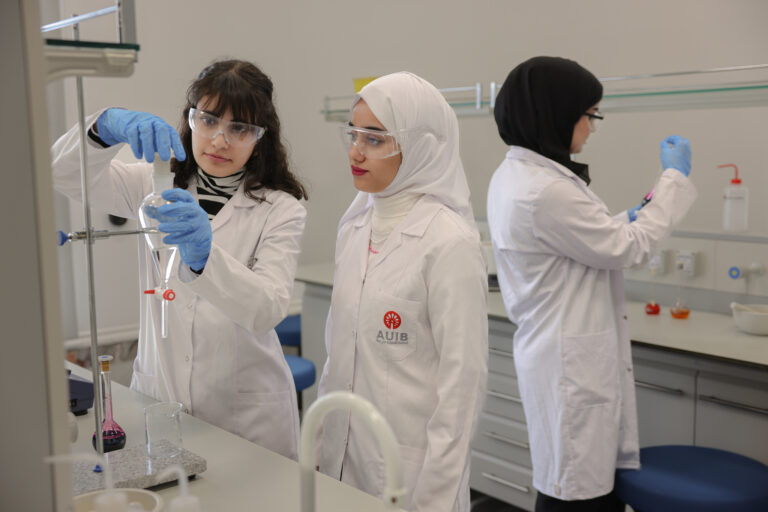College of Healthcare Technologies
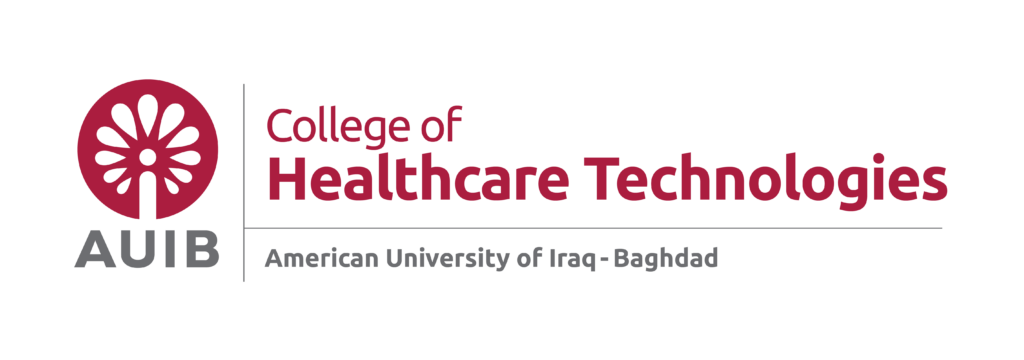
Dean’s Message
It is with great pride and enthusiasm that I welcome you, students and faculty, to join the College of Healthcare Technologies (CHT) in this mega project of establishing the foundation to support our future medical school and AUIB-University Hospital.
We are witnessing a revolution in healthcare professions and AI technologies. Therefore, we are committed to preparing professionals who are not only highly skilled and knowledgeable, but also compassionate leaders in healthcare professions.
As a newly established college, CHT currently offers four specialized undergraduate programs, based on combining theoretical education with practical, and real hands-on training in clinical settings. AS the new Dean of CHT, I am also excited to announce the launching of new undergraduate and postgraduate programs in the next 2 year; These programs include Medical Laboratory Sciences (MLS), Public Health (PH), Nutrition and Food Sciences (NFS), Rehabilitation Sciences (RS), and Healthcare Informatics and Administration (HIA).
I encourage you all to join us to transform healthcare in Iraq and the region, through the mega project of our future medical school and the AUIB-University Hospital. Therefore, I look forward to all that we will accomplish together in the months and years to come.
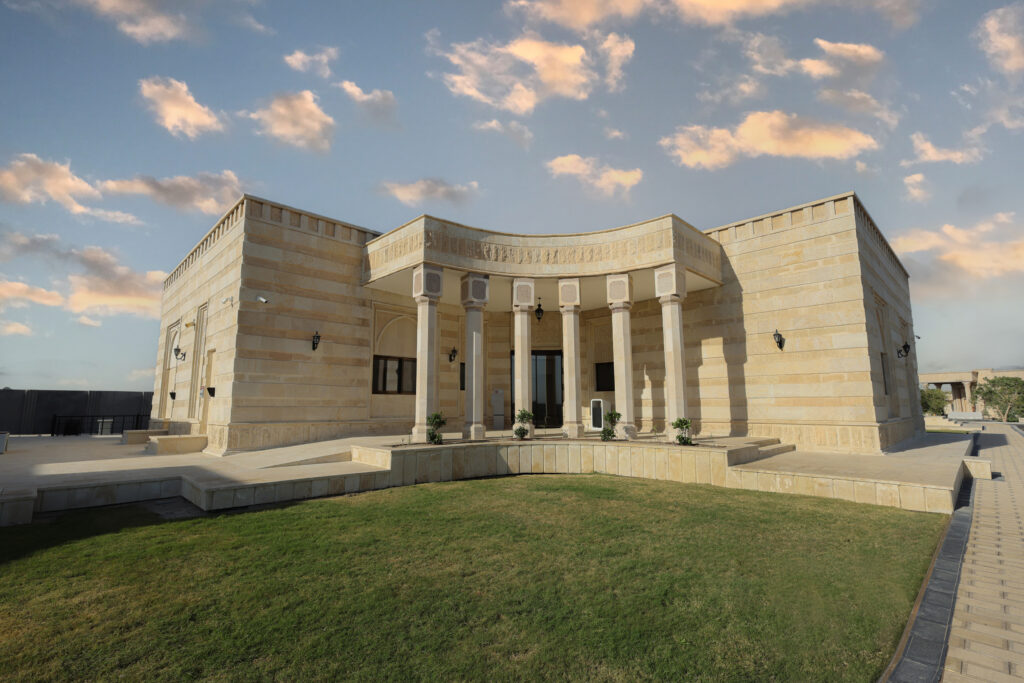
OVERVIEW
College of Healthcare Technologies (CHT) at AUIB offers an American-style education, beyond biomedical sciences, by providing practical experience in state-of-the-art facilities, and internships with practicing professionals in local hospitals, clinics, and laboratories. CAHS prepares students for direct job opportunities and careers that support, complement, and enhance the work of primary healthcare providers.
As a newly established college, CHT currently offers four specialized undergraduate programs, in which theoretical lecturing and practical hands-on clinical training are combined. Our college graduates will be qualified for a vast range of job opportunities to support patient care, at various departments in hospitals, private clinics, outpatient facilities, diagnostic labs, rehabilitation centers, research and development institutions, companies and other community health environments
Mission and Vision
Mission
The CHT’ mission is to advance healthcare through excellence in education, research, and innovation. Our mission is to educate future healthcare professionals in an ethical and patient-centered setting, conduct cutting-edge research, and foster a community dedicated to lifelong learning and service.
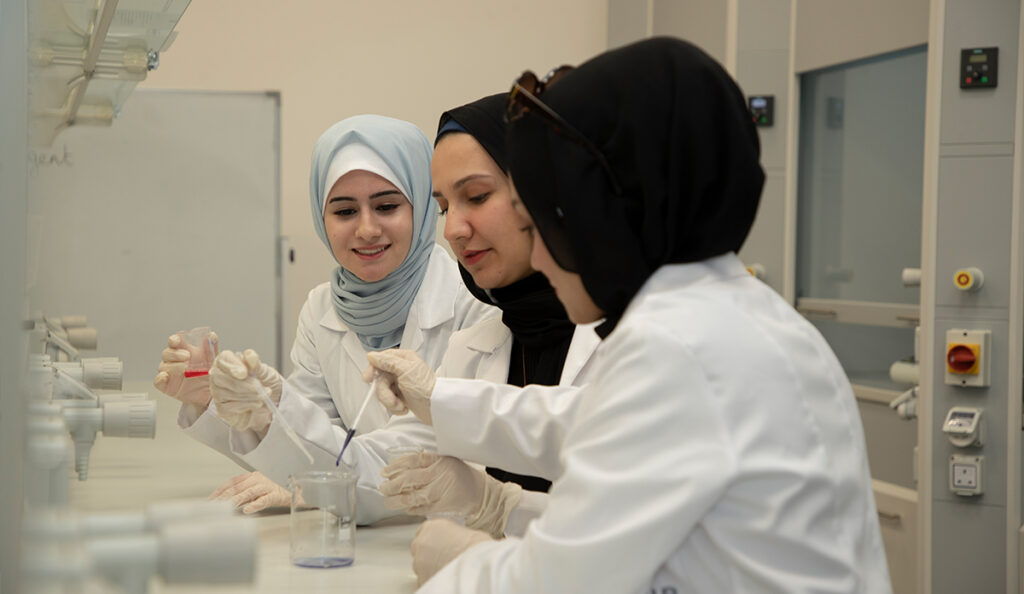
Vision
Through our community of Faculty and students, we aim to be a global leader in healthcare sciences and technology, recognized for our transformative education, pioneering research, and commitment to improving health and well-being. We envision a future where our graduates are at the forefront of healthcare innovation and our research leads to significant advancements in medical treatment and patient care.
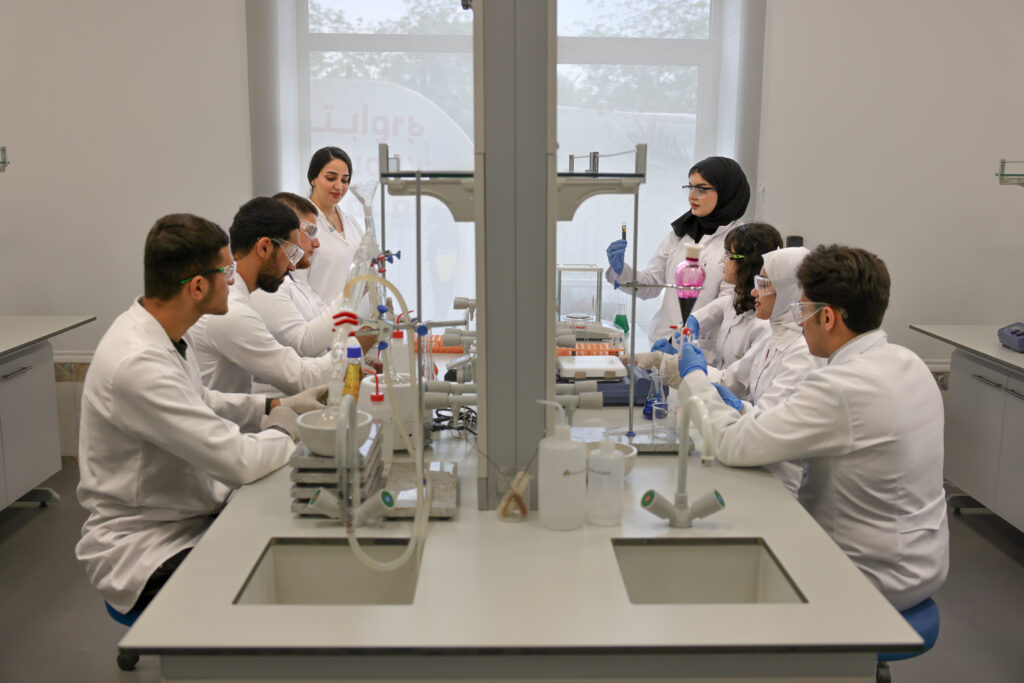
Undergraduate Programs
CHT offers the following Bachelor of Science (BS) programs:
- Radiologic Sciences & Technology
- Anesthesia
- Optometry and Vision Science
- Dental Sciences & Technology
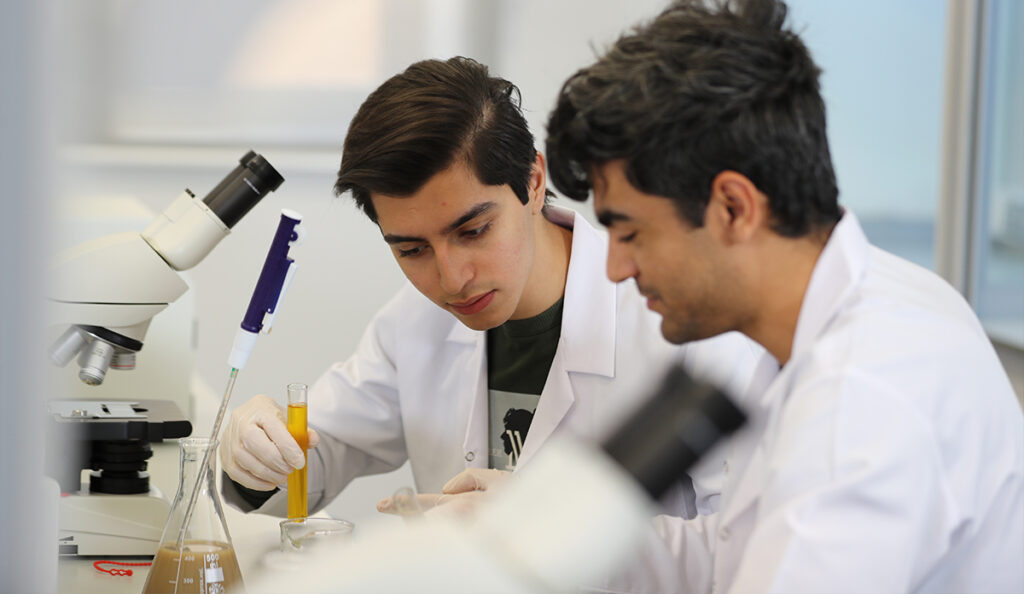
The anesthesia professional will support anesthesiologists during surgeries and other medical procedures to clinically manage the patient’s pain. The anesthesia professional works with and maintains the anesthesia equipment and supporting devices that the anesthesiologist needs.
Job Opportunities
Graduates in the field of anesthesia can be employed in the following structures or sectors:
- Anesthesia departments in hospitals
- Private clinics equipped with regional anesthesia set-up
- Pain clinics group-practices
- Anesthesia quality institutes (Anesthesia Societies)
- Laboratories conducting fundamental and/or clinical research on anesthesiology
- Artificial intelligence in anesthesiology research
- Pursue postgraduate studies
Program Curriculum
To graduate, students must complete 123 credit hours of theoretical learning and practical training. Here is a sample of courses offered in the program
| Year | Credits | |
|---|---|---|
| Course Requirements | Year | Credits |
| UNI 101: First-Year University experience* | 1 | 3 |
| ENL 101: Expository Writing | 1 | 3 |
| BIO 101: Introductory Biology | 1 | 3 |
| CHE 105: Chemistry for Healthcare Professions | 1 | 3 |
| HCT 101: Fundamentals of Healthcare Professions | 1 | 3 |
| CSC 101: Introduction to Computer Science | 1 | 3 |
| MAT 101: College Algebra | 1 | 3 |
| PHI 101: Introduction to Ethics | 1 | 3 |
| BIO 217: Human Anatomy and Physiology | 1 | 3 |
| BIO 217L: Human Anatomy and Physiology Lab | 1 | 1 |
| ANT 101: Introduction to Anesthesia Technology | 1 | 3 |
| HIS 101: Civilizations and History* | 2 | 3 |
| ENL 201: Academic Writing | 2 | 3 |
| CHE 215: Biochemistry for Health Care Professionals | 2 | 3 |
| ANT 240: Anesthesia Technology Instrumentation | 2 | 3 |
| ANT 240L: Anesthesia Technology Instrumentation Lab | 2 | 1 |
| HIS 102: Civilizations and History II* | 2 | 3 |
| ENL 210: Introduction to Public Speaking | 2 | 3 |
| BIO 218: Pathophysiology | 2 | 3 |
| BIO 2XX: Biostatistics and Epidemiology | 2 | 3 |
| ANT 245: Pharmacology in Anesthesia Practice | 2 | 3 |
| ANT 295: Practicum I | 2 | 3 |
| HUM 101: Introduction to Humanities* | 3 | 3 |
| ANT 320: Anesthesia Clinical Applications I | 3 | 3 |
| ANT 320L: Anesthesia Clinical Applications I Lab | 3 | 1 |
| ANT 340: Anesthesia Agents and Methods | 3 | 3 |
| ANT 340L: Anesthesia Agents and Methods Lab | 3 | 1 |
| ANT 330: Patient Monitoring Technology | 3 | 3 |
| ANT 343L: Operating Room Simulation Lab | 3 | 1 |
| ANT 350: Anesthesia Clinical Applications II | 3 | 3 |
| ANT 360: Perioperative Patient Care | 3 | 3 |
| ANT 370: Workroom Management | 3 | 1 |
| HCT 4XX: Technical Elective | 3 | 3 |
| ANT 390: Postanesthetic and Pain Management | 3 | 3 |
| ANT 399: Practicum I | 3 | 3 |
| SOC 101: Introduction to Sociology* | 4 | 3 |
| ANT 420: Anesthesia Clinical Applications III | 4 | 3 |
| ANT 460: Anesthetic Emergencies | 4 | 3 |
| ANT 460L: Anesthetic Emergencies Lab | 4 | 1 |
| ANT 410: Special Topics in Anesthesia Technology | 4 | 1 |
| ANT 430L: Anesthesia Quality Assurance Lab | 4 | 1 |
| ANT 490: Practicum II | 4 | 3 |
| PSY 101: Introduction to Psychology* | 4 | 3 |
| HCT 4XX: Technical Elective | 4 | 3 |
| ANT 455: Anesthetic Procedural Blocks | 4 | 3 |
| ANT 495: Practicum IV | 4 | 3 |
| ANT 496: Practicum V | 4 | 3 |
| HCT 480: Marketing in the Healthcare sector | 3 | |
| HCT 481: Health Informatics | 3 | |
| HCT 482: Leadership in Healthcare | 3 | |
| HCT 483: Introduction to Clinical Research | 3 |
Dental graduates are highly skilled professionals who are part of a dental team in charge of restoring the smile, the function, and the speech of patients. They combine their scientific knowledge with their artistic ingenuity to manipulate materials and to fabricate different kinds of intra-oral appliances like crowns, bridges, and dentures. Today, advancement in computer-aided dental technology is taking this profession to higher levels of artistic beauty and efficiency.
Job Opportunities
The Dental professional graduate from our program can work in a variety of fields:
- Public sector with the government or armed forces.
- Private sector, owning a private lab
- Private sector, working in a dental polyclinic or laboratory.
- Research and development of dental material for international companies.
- Pursue postgraduate studies.
Program Curriculum
To graduate, students must complete 120 credit hours of theoretical learning and practical training. Here are the courses offered in the program
| Year | Credits | |
|---|---|---|
| Course Requirements | Year | Credits |
| CHE 105 General Chemistry | 1 | 3 |
| MAT 101 College Algebra | 1 | 3 |
| BIO 101 Introductory Biology | 1 | 3 |
| UNI 101 First Year Uni Exp | 1 | 3 |
| ENL 101 Expository Writing | 1 | 3 |
| BDS 105 Medical physics | 1 | 3 |
| CSC 101 Introduction to Computer Science | 1 | 3 |
| BIO 217 Human Anatomy and Physiology | 1 | 3 |
| HCT 101 Fund Healthcare Prof | 1 | 3 |
| Core Liberal Arts Elective* | 1 | 3 |
| CHE 210 Organic Chemistry for Health Sciences | 2 | 3 |
| BDT 210 Dental Materials I | 2 | 3 |
| BDT 210L Dental Materials Lab | 2 | 1 |
| BDS 240 Introduction to Dentistry and Scientific evidence | 2 | 2 |
| ENL 101 Expository Writing | 2 | 3 |
| BDS 200L Dental anatomy lab | 2 | 1 |
| BDS 200 Dental Anatomy and Occlusion | 2 | 3 |
| BDT 211 Dental Materials II | 2 | 3 |
| ENV 201 Introduction to Environmental Science | 2 | 3 |
| PHI 101 Introduction to Ethics | 2 | 3 |
| Core Liberal Arts Elective* | 2 | 3 |
| BDS 217 Head and Neck Anatomy | 2 | 2 |
| BDS 217L Head and Neck Anatomy lab | 2 | 1 |
| BDT 320 Fixed Prosthodontics I | 3 | 3 |
| BDT 320L Fixed Prosthodontics lab | 3 | 1 |
| BDT 330 Partial Denture Prosthodontics I | 3 | 3 |
| BDT 340 Complete Denture Prosthodontics I | 3 | 3 |
| BDT 330L Removable prosthodontics lab I | 3 | 1 |
| BDT 350 Dental ceramics | 3 | 2 |
| Core Liberal Arts Elective | 3 | 3 |
| BDT 321L Fixed Prosthodontics lab II | 3 | 1 |
| BDT 331L Removable prosthodontics lab II | 3 | 1 |
| BDT 360 CAD CAM and Digital dentistry | 3 | 3 |
| BDT 370 Orthodontics/Pedodontics appliances | 3 | 3 |
| BDT 370 L Orthodontics/Pedodontics appliances lab I | 3 | 1 |
| BDT 380 Dental Implants | 3 | 3 |
| BDT 380L Dental Implants lab | 3 | 1 |
| FIN 101 Finance for Non-Business Students | 3 | 3 |
| BDT 460L Digital Dentistry lab I | 4 | 1 |
| BDT 420L Fixed Prosthodontics lab III | 4 | 1 |
| BDT 430L Removable prosthodontics lab III | 4 | 1 |
| BDT 470L Orthodontics/Pedodontics appliances lab II | 4 | 1 |
| BDT 490L Practical Laboratory Experience I | 4 | 3 |
| Core Liberal Arts Elective | 4 | 3 |
| BDT 496 Smile design | 4 | 3 |
| BDT 498 Dental laboratory management and Business procedures | 4 | 2 |
| BDT 461L CAD-CAM lab | 4 | 1 |
| BDT 492L Practical Laboratory Experience II | 4 | 3 |
| BDT 471L Orthodontics/Pedodontics appliances lab III | 4 | 1 |
| BDT 461L Digital Dentistry lab II | 4 | 1 |
| Technical electives * | 4 | 3 |
| Core Liberal Arts Elective | 4 | 3 |
Optometrists provide eye examinations, diagnose and manage vision disorders. They can practice independently or as part of a larger practice with other eyecare professionals.
Job Opportunities
Graduates in the field of optometry & vision science can be employed in the following sectors:
- Working in retail optical shops (as employee or as business owner).
- Working in hospitals and eyecare centers alongside ophthalmologists.
- Working in refractive surgery centers.
- Working in optical manufacturing companies (e.g. contact lens manufacturers)
- Vision screening for schools, the armed forces or charities.
- Pursuing postgraduate studies.
Program Curriculum
To graduate, students must complete 121 credit hours of theoretical learning and practical training. Here is a sample of courses offered in the program
| Year | Credits | |
|---|---|---|
| Course Requirements | Year | Credits |
| UNI 101: First-Year University Experience | 1 | 3 |
| MAT 101: College Algebra | 1 | 3 |
| BIO 101: Introductory Biology | 1 | 3 |
| PHY 100: Conceptual Physics | 1 | 3 |
| HCT 101: Fundamentals of Healthcare Professions | 1 | 3 |
| CSC 101: Introduction to Computer Science | 1 | 3 |
| OVS 101: Ocular Anatomy | 1 | 4 |
| OVS 110: Introduction to Physical Optics | 1 | 3 |
| OVS 115: Clinical Optometry and Refraction I | 1 | 2 |
| OVS 115L: Clinical Optometry and Refraction I Laboratory | 1 | 1 |
| OVS 211: Ocular Physiology | 1 | 3 |
| ENL 101: Expository Writing | 2 | 3 |
| OVS 210: Geometrical and Spectacles Optics | 2 | 3 |
| OVS 210L: Geometrical and Spectacles Optics Laboratory | 2 | 1 |
| OVS 215: Clinical Optometry and Refraction II | 2 | 3 |
| OVS 215L: Clinical Optometry and Refraction II Laboratory | 2 | 1 |
| OVS 251: Ocular disease and Pathophysiology I | 2 | 3 |
| ENL 201: Academic Writing | 2 | 3 |
| OVS 255: Visual perception and Color | 2 | 2 |
| OVS 261: Ocular Disease and Pathophysiology II | 2 | 3 |
| OVS 277L: Clinical Optometry and Optical Devices in Optometry I Laboratory | 2 | 1 |
| OVS 280: Neuroanatomy and Neuro-Ophthalmology | 2 | 3 |
| OVS 277: Clinical Optometry and Optical Devices in Optometry | 2 | 3 |
| PHI 101: Introduction to Ethics | 3 | 3 |
| OVS 220: Introduction to Soft Contact Lenses | 3 | 3 |
| OVS 220L: Introduction to Soft Contact Lenses Laboratory | 3 | 1 |
| OVS 310: Ocular Disease and Pathophysiology III | 3 | 3 |
| OVS 312: Introduction to Ocular Pharmacology | 3 | 3 |
| OVS 315L: Clinical optometry and Optical Devices in Optometry II Laboratory | 3 | 1 |
| ENL 210: Public Speaking | 3 | 3 |
| OVS 330L: Dispensing and Edging Laboratory | 3 | 2 |
| OVS 340: Low Vision | 3 | 2 |
| OVS 380: Special and Rigid Contact Lenses | 3 | 3 |
| OVS 380L: Special and Rigid Contact Lenses Laboratory | 3 | 1 |
| OVS 385: Glaucoma | 3 | 2 |
| CLA | 3 | 3 |
| OVS 390: Practicum I | 3 | 2 |
| CLA | 4 | 3 |
| CLA | 4 | 3 |
| OVS 388: Clinical Decision making in Optometry | 4 | 2 |
| OVS 495: Practicum II | 4 | 3 |
| HCT 210: Basic Life Support | 4 | 0 |
| HCT 4XX: Technical Elective | 4 | 3 |
| FIN 101: Finance for Non-Business Students | 4 | 3 |
| CLA | 4 | 3 |
| OVS 470: Pediatric Optometry, Binocular Vision and Strabismus | 4 | 3 |
| OVS 499: Practicum III | 4 | 3 |
| HCT 4XX: Technical Elective | 4 | 3 |
| HCT 480: Marketing in the Healthcare sector | 4 | 3 |
| HCT 481: Health Informatics | 4 | 3 |
| HCT 482: Leadership in Healthcare | 4 | 3 |
| HCT 483: Introduction to Clinical Research | 4 | 3 |
| HCT 485: Biostatistics and Epidemiology | 4 | 3 |
A radiologic professional graduate is a highly trained professional who operates the equipment used to take images for X-rays, catheterization lab (Cathlab), Nuclear medicine imaging (NMI), magnetic resonance imaging (MRI), computerized tomography (CT) and ultrasound imaging. These clinical images are essential for the diagnosis and treatment of many medical conditions. Thus, a radiologic professional is an important part of the healthcare team.
Job Opportunities
Radiologic professional graduates can work in any of the following settings:
- Hospitals, both governmental and private.
- Clinics
- University research labs
- Industry
- Commercial laboratories
- Can pursue their postgraduate studies
Program Curriculum
To graduate, students must complete 121 credit hours of theoretical learning and practical training. Here is a sample of courses offered in the program
| Year | Credits | |
|---|---|---|
| Course Requirements | Year | Credits |
| UNI 101: First-Year University Experience | 1 | 3 |
| ENL 101: Expository Writing | 1 | 3 |
| BIO 101: Introductory Biology | 1 | 3 |
| PHI 101: Introduction to Ethics | 1 | 3 |
| HCT 101: Fundamentals of Healthcare Professions | 1 | 3 |
| CSC 101: Introduction to Computer Science | 1 | 3 |
| MAT 102: Pre-calculus | 1 | 3 |
| PHY 100: Conceptual Physics | 1 | 3 |
| SOC 101: Introduction to Sociology | 1 | 3 |
| RAD 101: Introduction to Radiologic Sciences | 1 | 3 |
| HIS 101: Civilizations and History I | 2 | 3 |
| ENL 210: Academic Writing | 2 | 3 |
| HCT 207: Introduction to Radiation Protection | 2 | 1 |
| PHY 241: Medical Physics and Dosimetry | 2 | 3 |
| BIO 217: Human Anatomy and Physiology | 2 | 3 |
| BIO 217L: Human Anatomy and Physiology Laboratory | 2 | 1 |
| ENL 201: Introduction to Public Speaking | 2 | 3 |
| BIO 218: Pathophysiology | 2 | 3 |
| BIO 210: Biostatistics and Epidemiology | 2 | 3 |
| RAD 201: Medical Imaging Systems I | 2 | 3 |
| RAD 210: Contrast Agents and Radiopharmaceuticals | 2 | 3 |
| SOC 101: Introduction to Sociology | 3 | 3 |
| RAD 301: Medical Imaging Systems II | 3 | 3 |
| RAD 305: Imaging Procedures I | 3 | 3 |
| RAD 305L: Imaging Procedures I Lab | 3 | 1 |
| RAD 310: Radiographic Anatomy and Pathology I | 3 | 3 |
| RAD 315: Legal and Ethical Issues in Radiologic Sciences | 3 | 1 |
| HCT 209: First aid and Basic Life Support | 3 | 1 |
| MIS 101: Introduction to Management Information Systems | 3 | 3 |
| RAD 355: Imaging Procedures II | 3 | 3 |
| RAD 355L: Imaging Procedures II Lab | 3 | 1 |
| RAD 362: Clinical Best Practice | 3 | 1 |
| RAD 365: Introduction to Radiation Therapy | 3 | 3 |
| RAD 370: Computer Applications in Medical Imaging | 3 | 3 |
| RAD 370L: Computer Applications in Medical Imaging Lab | 3 | 1 |
| RAD 390: Practicum I: Internship in Clinical Imaging | 3 | 2 |
| HCT 4XX: Technical Elective | 4 | 3 |
| RAD 405: Imaging Procedures III | 4 | 3 |
| RAD 405L: Imaging Procedures III Lab | 4 | 1 |
| RAD 410: Special Topics in Radiological Sciences | 4 | 1 |
| RAD 420: Radiology Quality Assurance Laboratory | 4 | 1 |
| RAD 450: Practicum II: Internship in Clinical Imaging | 4 | 3 |
| HCT 331: Critical Appraisal Course | 4 | 1 |
| PSY 101: Introduction to Psychology | 4 | 3 |
| HCT 4XX: Technical Elective | 4 | 3 |
| RAD 450: Radiographic Anatomy and Pathology II | 4 | 3 |
| RAD 480: Radiology information systems | 4 | 1 |
| RAD 490: Practicum III: Internship in Clinical Imaging | 4 | 3 |
| RAD 460: Nuclear Medicine Imaging | 4 | 3 |
Download the College of Healthcare Technologies curriculum here or search the full AUIB Course Catalog below.
Download the 2024 Healthcare Tech CurriculumCURRENT FACULTY & STAFF
| FACULTY & STAFF | |
|---|---|
| Prof. Allal Ouhtit | Dean |
| Dr. David Claborn | Associate Dean |
| Ms. Ghufran Kadhim, BA | Administrative Assistant |
| Dr. Georges Tehini | Chair of Dental Technology Program |
| Dr. Abbas AL-Zubaidi | Assistant Professor |
| Dr. Diana Moukaddem | Assistant professor |
| Mrs. Maya Tannoury | Lecturer |
| Mr. Muhammad Muhammad | Laboratory Instructor |
| Ms. Mariam Abid Al Hassan Abbas Al Mowail | Laboratory Assistant |
| Mr. Mohammed Saadoon Barazanchi, BA | Optometry Lab Assistant |
| Dr. Vincent Fawzi Saliba, MSc, DESS, BDS | Lecturer |
BIOGRAPHIES
Dean
Professor, Biomedical Sciences
Biography
Allal Ouhtit is the Dean of the college of Healthcare Technologies. Dr. Ouhtit graduated from University Claude Bernard Lyon-I, France, with a PhD in Molecular/Cell Biology in 1995. He completed his postdoctoral fellowship at the International Agency for Research on Cancer (World Health Organization). He joined the MD Anderson Cancer Center, University of Texas, in Houston. In 2001, he was Lecturer at Queens University of Belfast, United Kingdom. In 2005, he joined the Louisiana State University Health Sciences Center and Stanley S Scott Cancer Center in New Orleans as a Principal Investigator. In 2009, he became the Head of Department of Genetics at Sultan Qaboos University in Oman and was promoted to Full Professor in 2014. He was a Professor at Qatar University since 2015, prior joining AUIB in September 2024.
Dean Ouhtit has extensive experience in academic and clinical program planning, development and review, program accreditation, ISO certifications, and clinical diagnostic laboratory management. He has extensive teaching experience and taught various courses in both biological and biomedical sciences, at both undergraduate and postgraduate levels.
The research of Dr. Ouhtit has received grant funding from various national and international organizations. His research leverages OMICS approaches to identify and validate genes and novel signaling pathways that underpin the process of breast cancer cell invasion and metastasis. He has published several papers in high impact journals, including his paper published in the journal Science in 1999.
Research Interests
- Precision Medicine
- Oncology
- Medical Genetics
- OMICS
- Nutrition and Food Sciences
Publications and H-Index
Administrative Assistant
Ghufran Kadhim holds a bachelor’s degree in Translation and a diploma in French Language from Al-Mustansiriyah University in Baghdad. Currently, she serves as the Administrative Assistant at the College of Healthcare Technologies at the American University in Baghdad. With a strong background in administration, Ghufran provides comprehensive support to various administrative functions, ensuring the smooth operation of the college.
She excels in maintaining organized records and files to ensure compliance with regulations and assist in efficient workflow within the department. Ghufran is dedicated to providing comprehensive support to faculty and students, enhancing the overall administrative operations of the college. Her commitment to effective communication and strong client relationships contributes to the success of the college’s mission in delivering quality healthcare education.
Associate Dean
Professor, Public Health
David Claborn is the Associate Dean of the College of Healthcare Technologies at the American University of Iraq-Baghdad. Prior to his arrival in Iraq, he was the Director of the Master of Public Health program at Missouri State University for 10 years. He obtained his Doctor of Public Health (DrPH) degree in 2001 from the F. Edward Hebert School of Medicine at the Uniformed Services University of the Health Sciences. He also has a master’s degree in Entomology and a bachelor’s degree in Zoology, both from Texas Tech University. He started out his professional career as a public health entomologist for the U.S. Navy working in many international settings, from Venezuela to Japan. His focus was on protecting people from diseases like dengue hemorrhagic fever, Japanese encephalitis, and malaria. In 2008, he joined the faculty of Missouri State University and in 2013 became the Director of the MPH program there. In response to the outbreak of Zika virus in North America and in collaboration with the state department of health, he initiated and managed the largest vector survey in the history of the state, documenting the presence of many invasive species and guiding Missouri counties on preparation for and response to outbreaks of vector-borne disease.
Research interests:
Public health risks in disturbed habitats
Epidemiology of vector-borne disease
Public health education
International health
Scientific writing
Publications
A partial list of publications is available here: https://pubmed.ncbi.nlm.nih.gov/?term=David%20M.%20Claborn
Professor, Dental Technology
Georges Tehini is the Chairman of the Dental Technology program in the College of Healthcare Technologies at the American University of Iraq-Baghdad. Prior to his arrival in Baghdad, he was the Chairman of the Prosthodontic Department and the Director of the Post-doctoral Prosthodontic program at the Lebanese University for many years. He obtained his Doctorate of Specialization in Odontological Sciences degree (DSOS) in 2018 from the School of Dentistry at the Lebanese University. Dr. Tehini also has a Master of Science degree and a Certificate of Advanced Graduate Studies, both from the faculty of the Henry M. Goldman School of Graduate Dentistry at Boston University. He previously obtained the Doctorate in Dental Surgery degree from the Saint Joseph University- Beirut. In 1992, he started his professional career as a private practitioner and a faculty member at Saint Joseph University. For many years, Dr. Tehini conducted numerous research projects and lectured in several countries in Europe, North Africa and the Middle East. From 1998 till 2010, he established and managed the Dental Technology Laboratory at the Lebanese University.
Research interests:
Removable and fixed prosthodontics
Implant prosthodontics
Dental implants and bone preservation
Overdenture implant attachments
Publications
A partial list of his publications is available: https://pubmed.ncbi.nlm.nih.gov/?term=tehini+g
Dr. Abbas AlZubaidi is an Assistant Professor of Radiology and Sonar at the College of Healthcare Technologies at the American University of Iraq-Baghdad (AUIB). He brings a rich background in advanced medical imaging technologies and a strong focus on integrating artificial intelligence (AI) into radiology. Before joining AUIB, Dr. AlZubaidi served as a Postdoctoral Researcher at the University of Saskatchewan’s Space MRI Lab, collaborating with the Canadian Space Agency to develop cutting-edge medical imaging modalities based on Quantum Magnetic sensors.
Dr. AlZubaidi earned his Dr.rer.medic degree (Doctorate of Theoretical Medicine) from RWTH Aachen University, Germany, with a specialization in neonatal medicine and imaging. His early career began in 1999, working in the fields of Biomedical Imaging and Artificial Intelligence, where he contributed to the development of AI algorithms and machine learning applications in MRI and CT imaging systems. He holds both an M.Sc. and B.Sc. in Biomedical Engineering from Al-Nahrain University, Baghdad, Iraq.
Dr. AlZubaidi’s research spans a wide range of innovative areas, including Space Medicine Technologies, Neonatal Imaging, AI in Radiology and Radiomics, Biomedical 3D Printing Technologies, and Clinical Simulations. His work is focused on advancing medical imaging for use in both terrestrial and space environments, and he has a deep commitment to exploring how AI can revolutionize radiology practices, improving both diagnostic accuracy and patient outcomes.
Throughout his career, which spanned over 25 years, Dr. AlZubaidi has been involved in numerous high-impact research projects and publications. His contributions include work on the clinical applications of quantum sensing in medical imaging, advancing neonatal imaging protocols, and the integration of AI in radiomics for improved diagnostic clinical processes. He continues to be an influential figure in the field of radiology and biomedical engineering, actively contributing to the development of new imaging technologies that aim to improve healthcare delivery both in Iraq and internationally.
Research Interests
- Space medicine technologies
- Neonatal Imaging
- AI in Radiology and Radiomics
- Biomedical 3D printing technologies
- Clinical Simulations technologies
Assistant professor
Biography
Diana Moukaddem is an instructor of optometry and vision science at the college of Healthcare Technologies. Dr. Moukaddem graduated from Glasgow Caledonian University (GCU), with a MSc in Investigative ophthalmology and vision research in 2018 and a PhD in optometry and vision science in 2024. During her doctoral studies, Dr. Diana served as an optometry clinical demonstrator at undergraduate levels in GCU and became an associate fellow of the higher education academy in the UK. Dr. Moukaddem is an optometrist; she worked for over two years in Beirut Eye and ENT Specialist hospital, a leading eye hospital in Lebanon, where she gained clinical experience, particularly in pediatric optometry and binocular vision.
Research Interests
- Hyperopia
- refractive error development
- choroidal thickness
- retinal vascular parameters
- ocular circadian rhythms
Publications
Mrs. Maya Tannoury graduated with a Master in Bio-analytical Toxicology from the American University of Science and Technology in Beirut, Lebanon. She joined the Refugee and Asylum seeker Health Initiative (RAHI) at the University of California, San Francisco (UCSF) and worked on assessing the healthcare needs of Syrian refugees in Beirut. She also worked on genotyping E. coli strains from urinary tract infections in refugee populations and determining their antimicrobial resistance in collaboration with the University of California, Berkeley (UC Berkeley).
In 2022, Mrs. Tannoury joined The Institute for Research and Information in Health Economics (IRDES), France, as a Project Coordinator to work on identifying migratory trends, mental disorders, and economic challenges of the refugee population in Lebanon post-COVID 19.
Research interests:
- Public health
- Global health
- Refugees’ health
- Infectious diseases
- Healthcare in underprivileged populations.
Publications
A list of publications is available here:
Instructor: Anesthesia Instrumentation Technology Lab (ANT240L).
Biography
Muhammad Muhammad is an instructor of anesthesia instrumentation lab at the college of Healthcare Technologies (AUIB). Mr. Muhammad graduated from Wollongong University in Australia (UOW), with a MSc in Science of anesthesia care with research targeting older people with dementia and delirium in 2016. In previous roles, Mr. Muhammad gained the knowledge and experience that hit the ground running and start making an immediate contribution in any work related to anesthesia and ICU care. He has expertise in the areas of all kinds of anesthesia professions with strong communication skills and the ability to convey complex concepts to various audiences.
Research Interests
- Anesthesia and RCU care
- Post-operative delirium
- Preoperative assessment
- Pain management
- Anesthesia complications
- Airway management
Publications
Laboratory Assistant
Mariam Abid Al Hassan Abbas Al Mowail is a Laboratory Assistant at the College of Healthcare, AUIB. She holds a Bachelor of Arts in English, a Diploma in Laboratory Technology from South Western Sydney Institute of Technical and Further Education, and a Certificate III in Pathology from Adept College, Sydney, Australia.
She began her career in medical laboratories, training at Medlab Pathology now trading as Australian Clinical Labs, where she gained hands-on experience. With a strong passion for continuous learning, she has developed expertise in laboratory procedures and diagnostic support. Mariam is committed to maintaining high standards in laboratory safety, medical imaging and laboratory operations to ensure quality patient care at the College of Healthcare within AUIB.
Optometry Lab Assistant
Mohammed holds a bachelor’s degree in Translation and a diploma in French Language from Al-Ma’moon University College. He serves as an Optometry Lab Assistant in the College of Healthcare Technologies at the American University in Baghdad. Mohammed has over seven years’ experience, working at optical and optometry businesses. He holds more than 15 certificates for medical devices from the biggest ophthalmic companies, many of these certificates which have been ranked number one on Iraq, the Middle East, or the Middle East and Eastern Europe. He has worked for many international companies in sales, and has acquired both theoretical and clinical skills in ophthalmology and optometry. Mohammed has made significant contributions in Iraq by implementing the latest technology in ophthalmology. Among his notable achievements, he has successfully introduced advanced diagnostic and surgical equipment, significantly improving patient care and outcomes in the region. He has also been recognized for his efforts in introducing the latest non-invasive glaucoma treatments to Iraq, participating in the implantation of the first artificial iris in Iraq, and contributing to over 20 brand new surgical solutions in ophthalmology.
Lecturer
Biography
Dr. Vincent Fawzi Saliba is a lecturer at the College of Healthcare Technologies, specializing in dental surgery and prosthodontics. He graduated from the Lebanese University with a Dental Surgeon Diploma in 2002, during which he was honored with the Exemplary Dental Student Award. He furthered his education by obtaining a Diploma in Oral Biology and a DESS in Fixed and Removable Prostheses, followed by a Research Master in Neuroscience. He is currently pursuing a PhD in Odontological Sciences at the University of Clermont Auvergne, France, in collaboration with the Lebanese University.
Dr. Saliba served as a lecturer in Prosthodontics at the Lebanese University since 2014 and previously at Beirut Arab University. In 2022, he was appointed “Maître de Conférence Associé” at the University of Clermont Auvergne’s Faculty of Odontology and joined AUIB in January 2025 as a Lecturer for the Bachelor in Dental Technology program. His clinical practice, established since 2002, focuses on aesthetic dentistry, full oral rehabilitation, and implant prosthodontics, with particular attention to smile design, minimally invasive techniques, and comprehensive treatment planning.
In addition to his teaching and clinical work, Dr. Saliba has contributed to the scientific community through research and publications. He participated in international conferences and postgraduate programs, sharing his expertise in implant prosthodontics and innovative treatment approaches.
Research Interests
- Aesthetic Dentistry
- Full Oral Rehabilitation
- Dental Technology
- Implant Prosthodontics
- Pain Management and Temporomandibular Disorders
- Oral Biology
Publication:
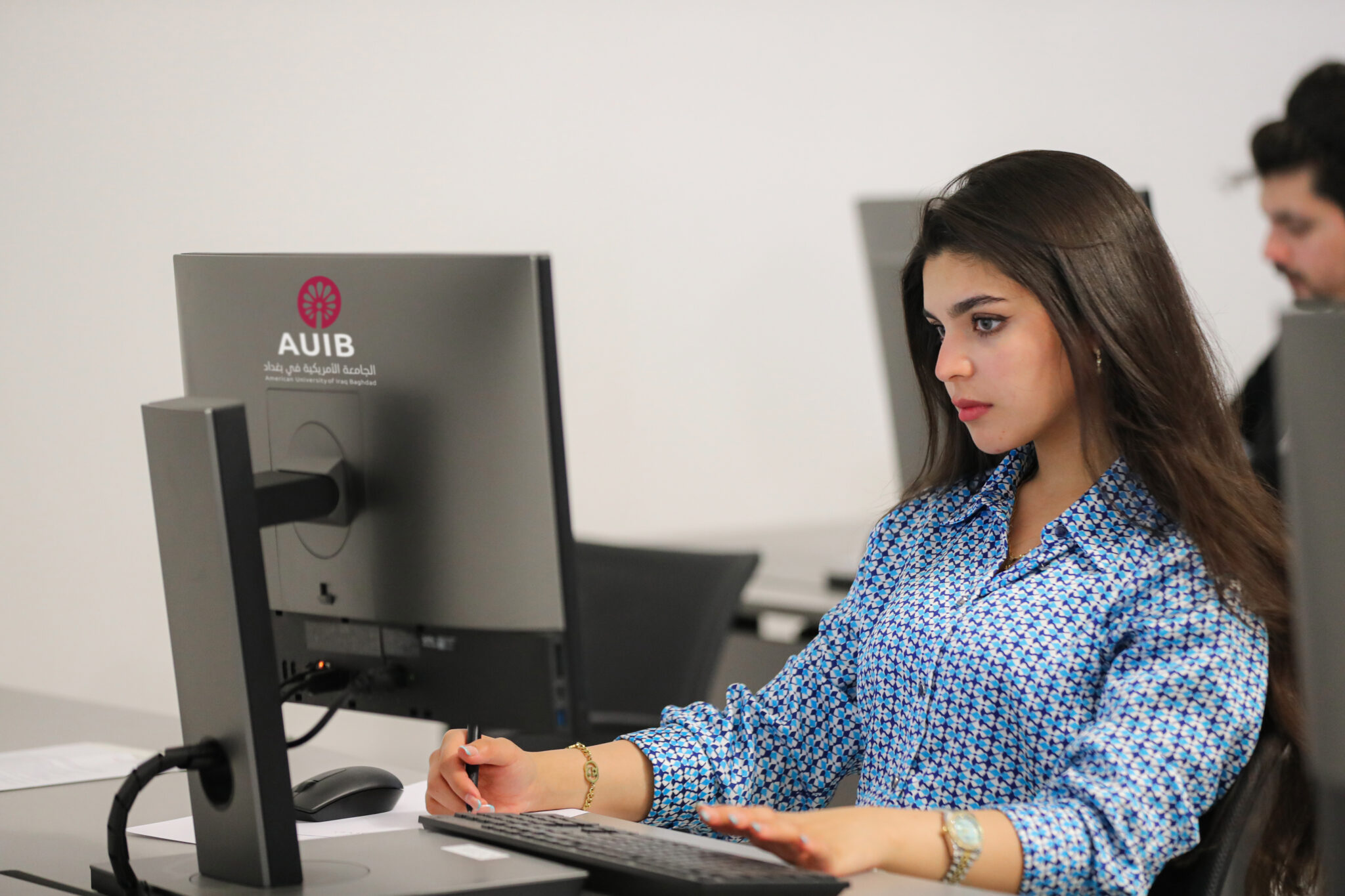
Course Catalogue
Welcome to the comprehensive course catalogue of The American University of Iraq – Baghdad (AUIB).
Our institution takes pride in offering a diverse array of academic programs, spanning across eight distinct colleges. As you embark on your educational journey, our course offerings encompass a rich tapestry of knowledge and opportunities. Explore our 20 programs meticulously designed to meet the evolving needs of today’s dynamic professional landscape.
From the arts and sciences to business, pharmacy, dentistry, and beyond, our commitment to excellence in education is reflected in each program’s curriculum. Whether you aspire to delve into the intricacies of healthcare technology, unravel the mysteries of the natural world, or cultivate business acumen, our colleges provide a supportive and enriching environment. We invite you to peruse this catalogue and discover the educational pathways that align with your passions and ambitions. At AUIB, we are dedicated to fostering a learning experience that transcends boundaries, preparing you for success in an ever-changing global landscape.
Your Gateway To Progress

Questions?
Talk with an Expert
We’re here to help! If you can’t find what you’re looking for or want additional information, please fill out our contact form and someone with contact you soon.
"*" indicates required fields

